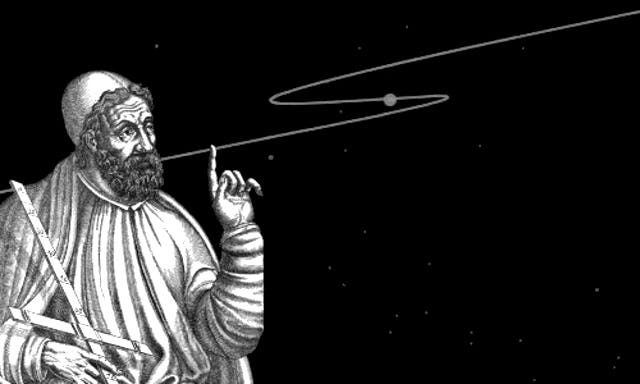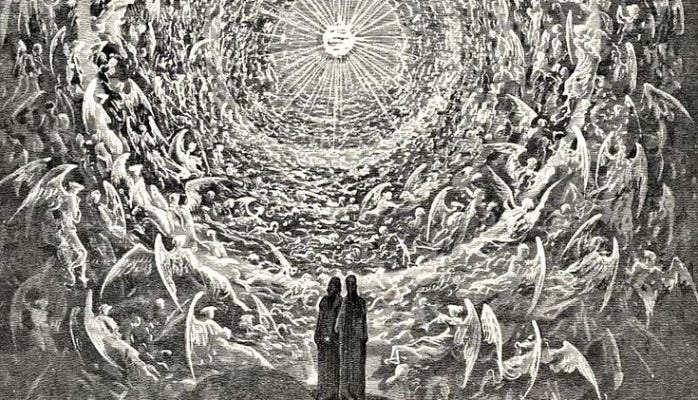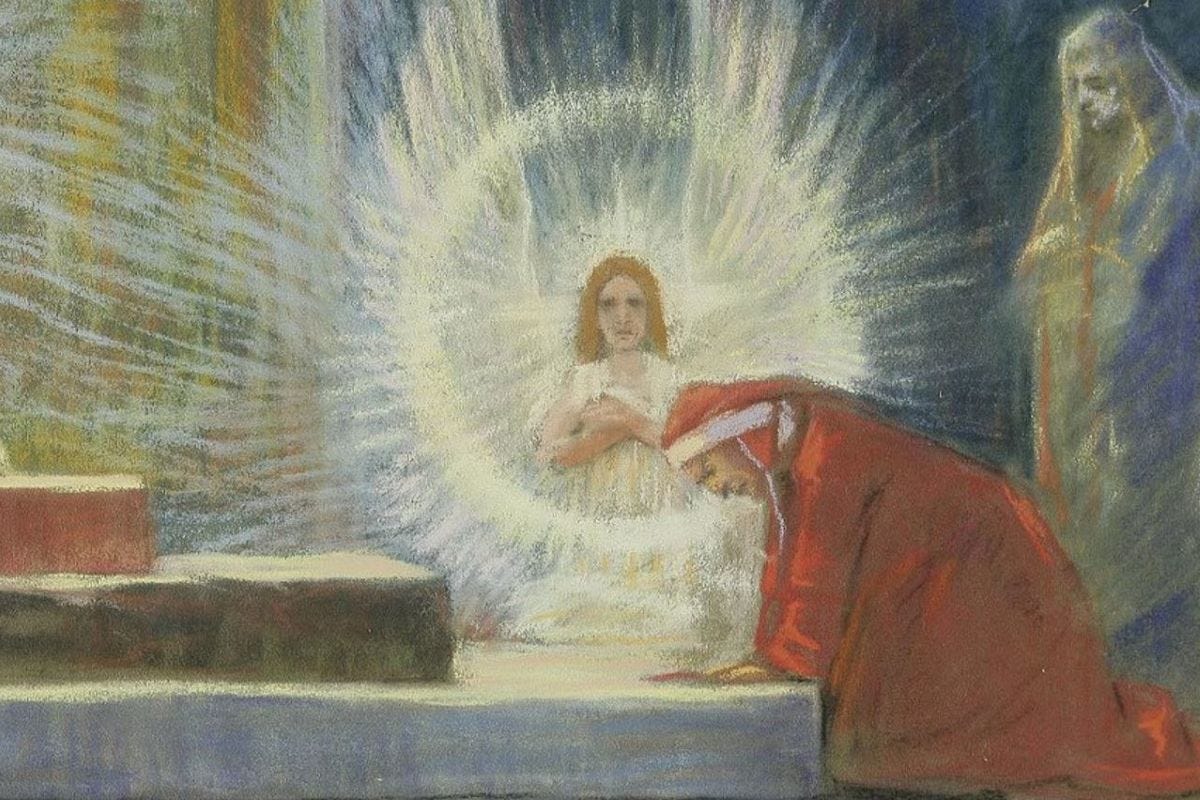Stairway to Heaven
How Dante's Divine Comedy unites cosmology and human destiny.
Happy New Year! Today, I’m diving deeper into the origins of Dante’s cosmology to help us understand and appreciate the startling, complex universe we’ll encounter in the Divine Comedy. Dante’s richly imagined medieval cosmos differs acutely from the modern, Carl Sagan-inspired conception. The more we grasp Dante’s view of reality, the better we can decipher the symbols and meanings embedded in his work. Those readers seeking to re-enchant their worldview through Dante’s eyes will find his universe an enthralling place.
I suspect that many readers who are new to the Divine Comedy will be tempted to treat Dante’s pervasive astronomical allusions like his other obscure references—by glossing over them. (Or the other option: getting lost in the footnotes!) But this risks missing both the profundity and nuance of Dante’s vision. My hope is that having a basic understanding of this poem’s cosmic architecture will help us elucidate more of its meaning.
“Remember this…that what you want to know about the Middle Ages will often not be in a book on the Middle Ages, but in the early chapters of some history of general philosophy or science.” C.S. Lewis, Letters of C.S. Lewis (7 June 1934)
Aristotle: Balancing Being and Becoming
In my last post, I explored how ancient cosmology was shaped by a fundamental debate between the eternal, unchanging nature of metaphysical being and the transient, mutable nature of becoming. By the time Aristotle joined the conversation in the 4th century BC with On the Heavens–a scientific work that deeply informed Dante’s knowledge of astronomy–several cosmic theories were already circulating, with such fanciful elements as the “music of the spheres” (Pythagoras) and a universal soul (Plato).
With customary acuity, Aristotle refined the ideas of Plato and the Pre-Socratics by seeking to balance the demands of empirical observation and deductive logic. His answer to the philosophical debate above was to juxtapose the mutable Earth and atmosphere below the Moon with the immutable heavens beyond it, as if encapsulating a bubble of change within a ball of permanence. This partition of the cosmos into “basement and loft” also supported Aristotle’s conviction that bodies move according to their elemental nature: uniform, circular motion for celestial bodies made of a hypothetical substance he called aether; and rectilinear motion (up, down, sideways) for the four sublunar elements of earth, water, air, and fire.
By assigning eternity and circular motion to the heavens, and linear time, growth, and decay to the sublunar realm, “the Aristotelian model of the universe solved the basic dilemma [of permanence and flux],” writes Arthur Koestler in The Sleepwalkers* (1959).1 This compromise, however, failed to provide an adequate solution to account for actual observations of planetary movements. The task of solving this dilemma would fall to a brilliant 2nd century Alexandrian polymath named Claudius Ptolemy.

Ptolemy’s Refinements
Working in the leading intellectual center of the day, Ptolemy sought to unify and improve the predictive ability of various cosmological theories (including Aristotle’s) in his first and most famous work, The Almagest. This treatise combined speculative philosophy with mathematical precision to become the definitive guide to astronomy for the next 1400 years. It was still admired in Dante’s time, who mentions Ptolemy’s work as noteworthy in the Convivio.
Ptolemy’s geocentric model consisted of a resting Earth surrounded by nine celestial spheres in which he postulated a combination of larger and smaller orbits (deferents and epicycles) to account for the variability of apparent planetary motion, while still maintaining the heavenly principle of uniform, circular movement. The observed variability he sought to explain included the baffling “retrograde” motion of the planets whose annual course across the sky appeared periodically to reverse direction relative to the fixed stars.
Ptolemy’s model retained Aristotle’s metaphysical division of being but significantly enhanced the predictive accuracy of celestial phenomena. His geocentric universe, though rejected scientifically today, was underpinned by intricate mechanisms and calculations that were finely calibrated to explain the apparent irregularities of planetary paths. The result was a highly functional theory of the cosmos that preserved the eternal perfection of the heavens, even as the sublunar world remained mired in impermanence.
Dante’s Cosmic Vision
Moving now into the Middle Ages, I want to show how Dante’s Divine Comedy draws upon earlier philosophical traditions, weaving together ancient and medieval cosmology to create a visionary scheme that surpasses its historical precedents. Where Aristotle merely brokered a metaphysical truce, Dante harmonizes Parmenidean being and Heraclitean becoming through the unification of mind and matter, soul and cosmos, in ways that reflect a deeply theological and humanistic worldview.
In the figure below, notice how Dante’s universe maintains Aristotle and Ptolemy’s geocentric perspective but imbues it with Christian theology and symbolism. He depicts the universe as a series of concentric spheres wrapped around a still Earth, with Hell at its frozen center and Mt. Purgatory rising from the ocean opposite Jerusalem. This sublunar realm looks up into nine ascending heavens, each nested within the next, like Russian dolls, from the Moon to the Primum Mobile. The last sphere contains no celestial bodies itself but initiates the movement of all the others through an impulse of metaphysical desire. Eluding the terminal boundary of the physical world is ultimately the Empyrean: the abode outside space and time where God dwells eternally in majesty surrounded by seraphim and saints.

Dante’s cosmos is not merely physical but permeated with consciousness. Each celestial sphere corresponds to a grouping of blessed souls whose special tendency or virtue is communicated to Earth through astral influence, following the medieval belief in the permeability of the material and spiritual worlds. For example, Dante calls the planet Venus “the cause of love here below,” an association steeped in pagan mythology while also evoking divine grace.2 Such astrological associations were not as widely censured by medieval Christians as they are today. C.S. Lewis notes in The Discarded Image* (1964) that a physical planet, its influence, and the pagan divinity “generally acted as a unity upon [the medieval] mind,” which disquieted neither theologian nor scientist.3
The integration of astrological and theological elements is one way that Dante seeks to harmonize pagan mythology with Christian belief, not as a form of syncretism but in an effort to illuminate ineffable realities with enduring symbols and archetypes. Dante’s conception of free will further underscores this synthesis: though celestial influences may sway human tendencies, they do not override the soul’s capacity for moral volition. This nuanced understanding of freedom reflects Dante’s sustained philosophical engagement with the dignity of human agency cooperating with divine will.
Cosmic Hierarchy and Unity
Dante’s hierarchical cosmos reflects a teleological order in which all creatures move across a “vast ocean of being” toward their destined port, their final end which is God.4 Just as the celestial spheres respond with motion to the “the Love that moves the sun and other stars,”5 the universe itself acts as a “stairway to heaven” which a special creature–Man–ascends by degrees in his growing desire for God. It’s this human destiny which finally explains the existence of the universe:
“In this sense, nature seems ordered to the human purpose and is incomplete without it…the cosmos does not exist for itself, nor directly for its Creator, but rather, it exists as part of an order whose completion is found in the mind of the rational creature and his own purposeful end. Logically, this view means not that man ends in the cosmos, but that the cosmos ends in man.” James V. Schall, The Order of Things*
The image of mutable humanity united with the universe towards an eternal purpose that transcends them both thus reconciles the ancient antagonism between flux and permanence. The celestial spheres mirror divine order, while the earthly realm reflects human striving and transformation. By uniting them, Dante’s cosmology offers a vision of the universe where mind and matter, soul and nature, are integrally connected. The heavens not only signify the grandeur and diversity of creation but also stand as an invitation to each person to “reach beyond the stars” in his spiritual striving. The Pilgrim’s journey is an allegory of every soul’s journey toward Being, a microcosm of the eschatological fulfillment of the heavens and the earth.
Dante Alighieri’s Divine Comedy represents the culmination of ancient and medieval cosmological thought, offering a meaningful model of reality that situates humanity at the center of a divinely ordered cosmos. By building upon Aristotle’s metaphysical distinctions and Ptolemy’s observational precision, Dante crafts a cosmology that integrates the temporal and eternal, substance and spirit. His vision transcends mere scientific description, offering a symbolic framework that reflects the unity of creation and the soul’s journey toward divine fulfillment. In doing so, Dante achieves what Aristotle’s cosmology could not: a true reconciliation of being and becoming within a cosmos that is as much a spiritual as a physical reality. By weaving theological insight with philosophical rigor, Dante invites readers to contemplate the interconnectedness of all existence and the ultimate goal of union with the Divine.
Arthur Koestler as quoted in Dennis Danielson’s The Book Of The Cosmos: Imagining The Universe From Heraclitus To Hawking, Kindle edition. (Basic Books, 2001).
Alighieri, Il Convivio, II.5.
C. S. Lewis, The Discarded Image: An Introduction to Medieval and Renaissance Literature, Kindle Edition. (HarperOne, 2013) 55.
Dante Alighieri, Paradiso, I.109-114.
Ibid, XXXIII.145
*As an Amazon Associate, I earn from qualifying purchases made through links in this article.






Amazing. Thank you Amy. Since I was a student of Literature and History, I think that medieval time reached a point of maximum clarity in the understanding and exposition of the relation between Heaven and Earth and Dante wrote, under God inspiration, the conclusive summary of the time that European population was most close and focus on God. After him, all is humanism. Your writing is really bringing out the importance of this time and in a way that I can offer to people that consider my interests useless or even wrong. Thanks to make difficult concepts easier without compromising their original beauty and loftiness.
Happy New Year; if only it had started without the carnage. Tragic and infuriating.
One of the best references I’ve found to make sense of Dante’s cosmos (which can surely induce vertigo) is “The Sun and the Other Stars of Dante Alighieri — A Cosmographic Journey Through the Divina Commedia.” It’s written by two Italian astrophysicists. One, Sperello di Serego Alighieri, is a descendant of Dante. There’s a fascinating 2023 interview (podcast and transcript) at Plough.com about the book (the interviewer described it as the “Hitchhiker’s Guide” to Dante’s cosmography.) The book describes the historical setting, astronomy before Dante, and then offers a detailed tour of Dante’s parallel universes and two orders of experience (the physical and the spiritual). The podcast interviewer (Susannah Black) aptly described the completeness of Dante’s perspective as a “synoptic and complete vision” “because he brings classical myth and Biblical reference and scientific observation together in these incredibly condensed ways.” The totality and coherence of his cosmological vision is astounding — interweaving philosophy, astronomy, astrology, theology, culture, politics, and history. Richard L. Poss, in his paper “Stars and Spirituality in the Cosmology of Dante’s Commedia,” cites Professor Giuseppe Mazzotta describing the fusion as a 'translation of Beatitude into astronomical terms'.”
One interesting and pretty cheeky initiative (for the Middle Ages) was making Beatrice his astronomy teacher and coach. In Canto II of Paradiso, in the course of her querying him about the meaning of spots on the moon, she confidently explains that his usual ways of attaining knowledge, through his senses and his reason, are inadequate for grasping the spiritual realities of the heavens. She says “Now, forasmuch as, following the senses, Thou seest that reason has short wings.” Thus the need for a novel and nuanced approach to the fusion of Christian theology and pagan cosmology.
I’m particularly partial to his depiction of Mars (traditionally associated, of course, with war and aggression in Roman mythology) — he portrays it as the heavenly sphere reflecting not just physical battle, but also spiritual warfare, with the Holy Warriors who fought for their faith or in just causes, symbolizing courage, martial valor, and zeal in defense of the Christian faith or for justice. It’s a planet of heroes — his great-great-grandfather Cacciaguida (killed during the Second Crusade), and Joshua, Judas Maccabeus, Charlemagne, Roland, William of Orange, Renouard, Godfrey of Bouillon and Robert Guiscard. Mad respect given by him to the “Martian” warrior class from a fellow veteran of both spiritual and physical battle (Dante was a cavalryman at the Battle of Campaldino in 1289).
Two minor points of inquiry: you say he provided “…a meaningful model of reality that situates humanity at the center of a divinely ordered cosmos.” First, perhaps he actually hinted at a more modern astronomical approach (to the solar system) since he placed the (Sun) God at the center of his cosmos (there were Greek astronomers that had explored the theory of a heliocentric system). Second, Earth is the center of his physical universe, but theologically, God is the true center and prime mover of all, including humanity, in his cosmos.
Thanks again for helping to make sense of his ordered but dauntingly complex universe.